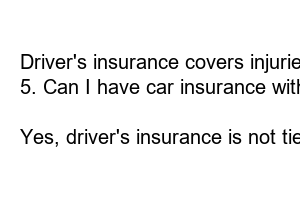자동차보험 운전자보험 차이
Title: Understanding the Differences between Car Insurance and Driver’s Insurance
Introduction:
When it comes to insurance, it’s important to be well-informed about the different options available to protect yourself and your assets. Two commonly confused types of insurance are car insurance and driver’s insurance. Although they may seem similar, there are distinct differences between the two that every driver should be aware of. In this blog post, we will break down these differences while providing you with a comprehensive understanding of both car insurance and driver’s insurance.
1. What is Car Insurance?
Car insurance is a type of coverage that protects your vehicle in the event of accidents, theft, or any damage. It typically includes liability coverage, which helps to cover expenses related to third-party bodily injury or property damage. Furthermore, car insurance also offers coverage for repairs or replacement costs in case of accidents, regardless of who is at fault.
2. What is Driver’s Insurance?
Driver’s insurance, on the other hand, is coverage that specifically protects the driver rather than the vehicle. It provides financial protection in case of physical injuries sustained while driving, regardless of who is at fault. This coverage includes medical expenses, rehabilitation costs, lost wages, and, in unfortunate circumstances, funeral expenses for the driver.
3. Coverage Focus:
Car insurance is primarily focused on safeguarding the vehicle and its value while driver’s insurance concentrates on protecting the driver and their well-being in case of injury.
4. Policy Considerations:
Car insurance policies often consider factors like the make and model of the car, its age, and the driver’s driving history to determine premium rates. In contrast, driver’s insurance policies primarily assess the driver’s age, health condition, and driving record to calculate rates and coverage eligibility.
5. Ownership Considerations:
Car insurance is generally required when you own a vehicle, while driver’s insurance is an optional coverage that can be beneficial to individuals who frequently drive but do not own a car themselves.
6. Combining Both Insurances:
Navigating the intricacies of car and driver’s insurance can sometimes be confusing. In some cases, it may be beneficial to combine both insurances to ensure comprehensive coverage that protects both the vehicle and the driver.
Summary:
In conclusion, car insurance primarily focuses on protecting the vehicle from damage or loss, whereas driver’s insurance offers coverage specifically for the driver’s well-being in case of injury. While car insurance is essential for vehicle owners, driver’s insurance can be advantageous for those who frequently drive but do not own a car. Understanding these differences can help you make informed decisions to ensure the right coverage for your unique circumstances and peace of mind on the road.
FAQs:
1. Are car insurance and driver’s insurance mandatory requirements?
Car insurance is generally mandatory, while driver’s insurance is typically optional but can be beneficial, especially for non-car owners.
2. Can driver’s insurance cover passengers in my vehicle?
No, driver’s insurance is designed to protect the driver specifically and does not extend to cover passengers.
3. How are car insurance premiums determined?
Car insurance premiums depend on various factors including the make and model of the vehicle, its age, and the driver’s driving history.
4. Does driver’s insurance cover all types of injuries sustained while driving?
Driver’s insurance covers injuries sustained while driving but may have specific limitations or exclusions that vary between policies.
5. Can I have car insurance without a valid driver’s license?
While it is possible to insure a car without a valid driver’s license, it may significantly impact your coverage and premium rates.
6. Can I have driver’s insurance without owning a vehicle?
Yes, driver’s insurance is not tied to ownership of a vehicle and can provide coverage for individuals who frequently drive but do not own a car.

